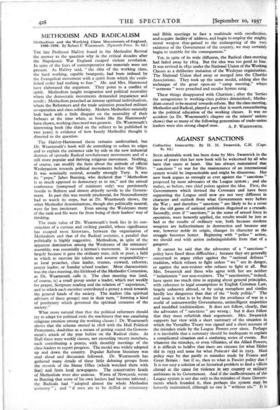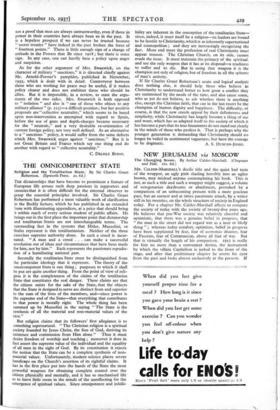AGAINST SANCTIONS
Sum admirable work has been done by Mrs. Swanwick in the cause of peace that her new book will be welcomed by all who have that cause at heart She has always maintained that " sanctions " or war for the maintenance of an international system would be impracticable and might be disastrous. Her new book argues as strongly as ever against the " sanctions " proposed by most advocates of the League system; and she makes, as before, two chief points against the idea. First, the Governments which devised the Covenant and have been supporting the League until now are not very different in character and outlook frunt what Governments were before the War; and therefore " sanctions " are likely to be a cover for the old game of national ambitions disguised as a crusade. Secondly, even if "sanctions," in the sense of armed force in operation, were honestly applied, the results would be just as bad as the results of ordinary war, both because modern weapons are indiscriminate in destruction and because any war, however noble its origin, changes its character as the struggle becomes hotter. Beginning with " police " action, we should end with action indistinguishable from that of a gangster.
It cannot be said that the advocates of a " sanctions " policy have faced these difficulties ; because they are generally concerned to argue either against the "national defence" tradition, which refuses to fight unless " we " are in danger, or against the non-resister who refuses to fight at all. But Mrs. Swanwick and those who agree with her are neither "isolationists "nor non-resisters. The " sanctionists," indeed, have spent too much time in arguing about general principles, with reference to legal assumptions in English Common Law, largely unknown abroad, or by using metaphors and similes hardly less dangerous than that of the "body politic." The lea/ issue is what is to be done for the avoidance of war in a world of untrustworthy Governments, unintelligent majorities and muddled traditionalism. It does not follow, clearly, that the advocates of " sanctions " are wrong; but it does follow that they must refurbish their arguments. Mrs. Swanwick supports her view with a short summary of the situation in which the Versailles Treaty was signed and a short account of the mistakes made by the League Powers ever since. Perhaps it is inevitable that a summary should be inadequate to explain a complicated situation and a confusing series of events. But whatever the mistakes, or even villainies, of the Allied Powers, it is difficult to believe that there are excuses for what Hitler did in 5933 and none for what Poincare did in 1923. Nazi policy may be due partly to mistakes made by France and Great Britain : but if so, then to what is Fascist policy due ? It is too easy a solution of an historical problem to find a villain abroad as the cause for violence in any country or military ambitions in its Government. And if the ineffectiveness of the League system is not due only to the mistakes of those Govern- ments which founded it, then perhaps the, system may be honestly maintained, although no one is " without sin." It is
not a proof that men are always untrustworthy, even if those in power in their countries have always been so in the past. It is a hopeless prospect if we can never be trusted because "secret treaties" have indeed in the past broken the force of "fourteen points." There is little enough sign of a change of attitude in the Powers that Be since 1918; but there is some sign. In any case, one can hardly base a policy upon anger and suspicion.
As for the other argument of Mrs. Swanwick, on the character of military "sanctions," it is directed chiefly against Mr. Arnold-Forster's pamphlet, published in November, 1935, which is dealt with in detail. Controversy between those who are working for peace may be useful, if it makes policy clearer and does not embitter those who should be allies. But it is impossible, in a review, to state the argu- ments of the two sides. Mrs. Swanwick is both opposed to " isolation " and also is "one of those who object to any military affiance" (p. 215)—a difficult position; but her positive proposals are "collective neutrality," which seems to be based upon non-intervention as attempted with regard to Spain, before the use of guns and depth-charges became necessary for the "neutrals," and a very desirable re-orientation of
current foreign policy, not very well defined. As an alternative to a "sanctions " policy, it would suffer from the same defects which Mrs. Swanwick urges against "sanctions." But it is not Great Britain and France which say one thing and do another with regard to "collective neutrality."
C. DELISLE BURNS.











































 Previous page
Previous page